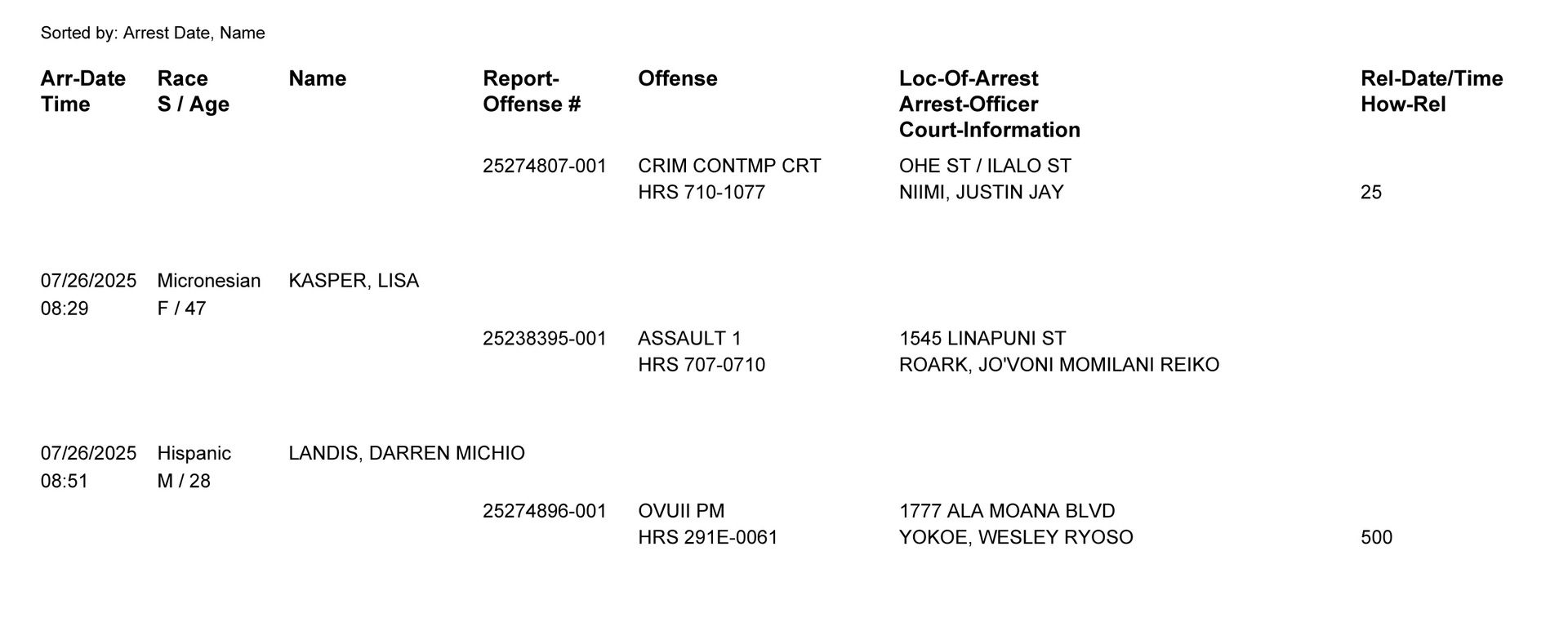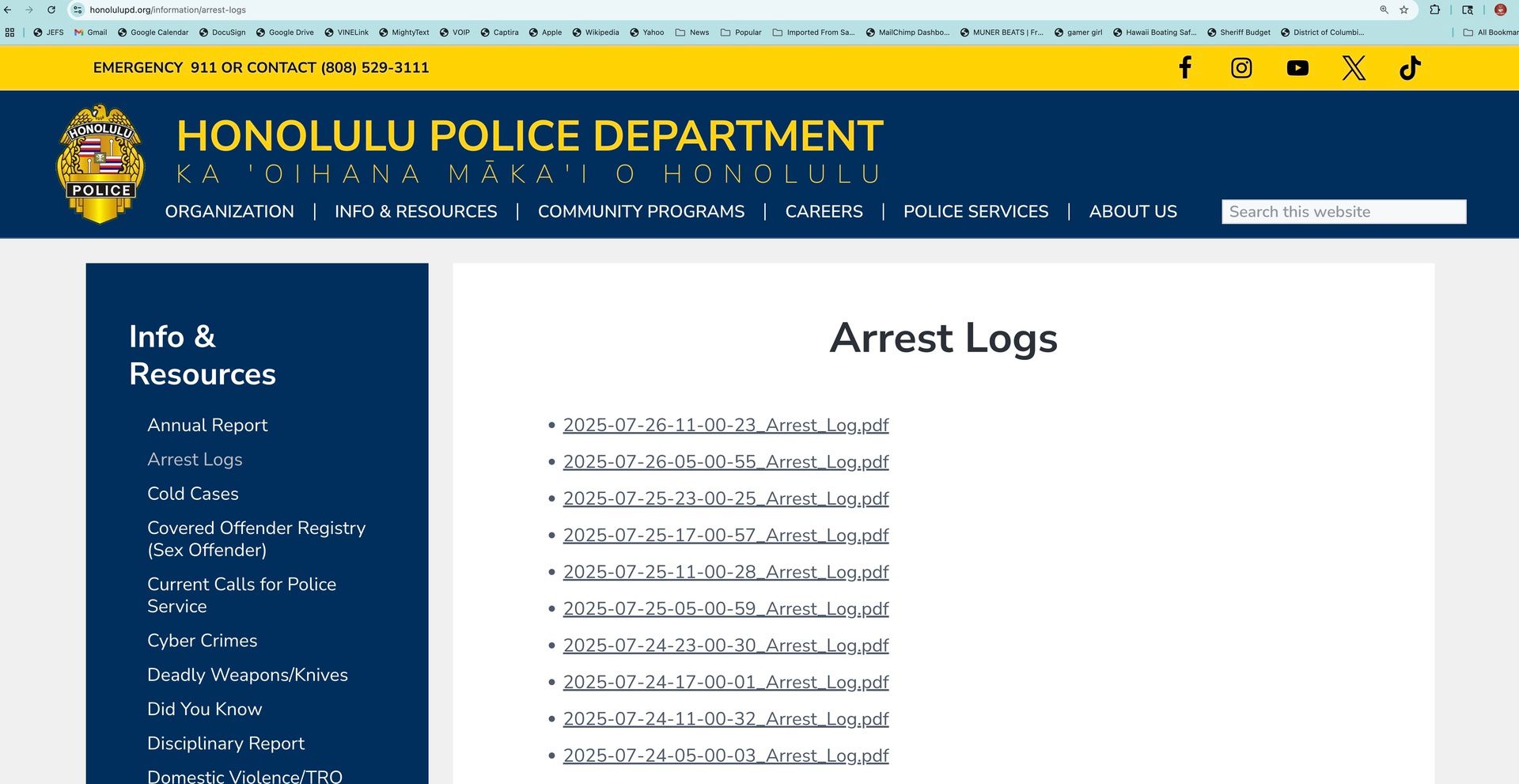- Jail Mail
- Posts
- How to Turn In, Bail Out, and Not Screw It Up: A 48-Hour Arrest Survival Guide
How to Turn In, Bail Out, and Not Screw It Up: A 48-Hour Arrest Survival Guide
A step-by-step guide for surviving HPD's 48-hour felony investigation - PART ONE
Aloha Subscribers:

This week’s Jail Mail is a practical guide to surviving the all-too-common 48-hour felony investigation hold—especially in domestic violence-related arrests. If you or your loved one ever get caught in the system, here's how to navigate it smartly, quietly, and efficiently.
⚠️ Most Common Charges That Trigger 48-Hour Holds

Abuse of a Household Member (Felony Investigation)
This is by far the most common. Even verbal fights between star-crossed lovers can lead to arrests if a nosy, do-good neighbor calls 911 out of the blue. It’s a politically sensitive area, so law enforcement will always err on the side of caution, and if they respond to a call, anticipate someone going to jail.

Assault in the Second Degree (Class C Felony)
This charge is closely tied to domestic abuse cases and often used when police want to escalate the situation from a misdemeanor to a felony. It doesn’t take much.

Minor Injuries = Felony?
Something as small as broken skin from a bite or scrape can qualify as “substantial bodily injury,” especially if the officer feels pressure to act.

“Dangerous Instrument” = Anything
The law defines this loosely. A pencil, a fork, or even a phone charger can be considered a dangerous instrument depending on how it's used—or claimed to be used.

Protected People Trigger Felony Charges
If the person injured is a health care worker, elderly person, or government employee performing their job, the charge can automatically be bumped to felony level—even if the actual injury is minimal.

Sexual Assault Allegations (Felony Investigation)

One of the most explosive charges in a child custody or divorce battle is sex assault. Hawaii law treats any claim of non-consensual sex, underage contact, or coerced touching as a felony—often first or second degree. Even without physical evidence, allegations alone can trigger an arrest and 48-hour investigation with near and long-term legal fallout. In family court, it’s a weapon—truthful or not.
🧠 Common Mistakes That Get People in Deeper Trouble
Letting Police In the House
A warrant of arrest is NOT a search warrant. Don’t open the door and let police open an investigation in your home unwelcomed.

Giving a Statement Without a Lawyer
Say these two lines, and then shut up:
“I would like to speak with my attorney first.”
“I politely decline to make any statement at this time.”

Police aren’t checking on your well-being. They’re building a case to charge and arrest you, period. Don’t be a sucker and fall for the charm of a friendly officer claiming to just be collecting information or responding to a wellness check.
Handing Over Keys or Property

Do not give keys, laptops, iPads, or phones to law enforcement—ever. If a LEO asks for it, again, refer back to "I decline to make a statement at this moment." Just last week, a client’s girlfriend handed over apartment keys to an HPD officer thinking she was cooperating in good faith. Turns out, those keys gave HPD access to a residence where they found cash, drugs, and a phone with text messages of soon-to-be charged co-conspirators.

Those materials got passed to the feds, and a simple state-level class C felony investigation exploded into a federal case carrying a 20-year sentence. Tens of thousands of dollars that could’ve funded a defense are now evidence against the client.
Moral of the story: Keep your mouth shut—and your keys in your pocket, girlfriends.
🚨 What to Do When Someone Gets Arrested

Step 1: Call your attorney.
Step 2: Call your bail agent (me).
Step 3: If possible, have your attorney visit the arrested person immediately.
Only direct family and attorneys can visit during the investigation hold. Attorneys often charge $1,000 for emergency visits—but it can be worth every penny to stop a dumb statement early. The visit is only for 3 minutes, but a reminder to “not snitch on yourself” can be worth years of future freedom.

🔇 Why You Don’t Talk

People love to talk. Don’t. Never “volunteer” information when the case can be baseless or shaky at best. It’s the government’s burden to prove wrongdoing—don't do their work for them by providing even a single detail in their investigation.
⏱ How to Track the 48-Hour Clock

1–2 hours after arrest:
Call HPD Receiving at (808) 723-3000 and ask,
“Is [insert name] in custody?”
If yes, follow up with,
“charges filed, or still pending?”
Later that day:
Google “HPD Arrest Log” or CLICK THE SCREENSHOT ABOVE to find the official time of arrest and see what charges your loved one is under investigation for.

This simple workflow tells you:
-When the 48-hour hold started
-What charges to prepare for
-location of arrest
Wrap-Up
Knowing your rights and following this game plan could mean the difference between walking out of custody in two days—or being stuck in jail, over-charged, and under-prepared.

Next week, we’ll finish up with Part Two of the 48-Hour Investigation Guide—where I’ll share:
When you get the most bang for your buck when hiring an attorney
How to reduce your time in custody on a 48-hour hold (yes, it’s possible)
And why it actually matters what you wear and eat before turning yourself in
Until then, save this issue, share it with someone you care about, and remember—if someone calls you saying “he’s getting booked,” you already know what to do.
Stay safe, stay smart,
Got Bail Nick
What did you think of today's issue of JAIL MAIL |
